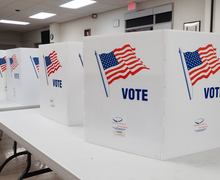Justice throws out accounting professor’s lawsuit against Syracuse University, administration, faculty members
A county Supreme Court justice has thrown out an accounting professor’s lawsuit against Syracuse University, which alleged he was shunned after bringing “excessively high” course grades and rigging in the tenure process to light.
David Harris’ attorney filed the lawsuit in Onondaga County Supreme Court in March. Along with SU, Interim Chancellor Eric Spina; former Chancellor Nancy Cantor; former Whitman dean Melvin Stith; accounting professor Randal Elder; and associate accounting professor Susan Albring were named as defendants. The decision to dismiss the case is dated Dec. 4.
Albring, Stith and Elder declined to be interviewed for this story. Through Kevin Quinn, senior vice president for public affairs at SU, the university, Cantor and Spina declined as well.
“There’s absolutely no question I’ll appeal,” Harris said in an interview, adding he didn’t believe his case was weak and that he “couldn’t possibly imagine” how the justice reached the decision to toss the lawsuit.
The 15-page decision outlines why the lawsuit’s counts of defamation, breach of contract, discrimination, retaliation and intentional infliction of emotional distress don’t stand.
In the lawsuit, Harris alleges that on March 23, 2012 he met with Albring to discuss her four-year performance evaluation, including several problems she needed to fix to improve her chances of getting tenure. These issues included an “excessively high grade point average” in her classes, according to the lawsuit. Harris was then chair of the Lubin School of Accounting in Whitman. He had the responsibility of meeting with untenured faculty members to help them meet the school’s tenure requirements.
Harris asserts in the lawsuit that Albring refused to sign her evaluation. She took the form and ran out of the room, saying she was going to “speak with Randy [Elder],” who was Whitman senior associate dean, about them, according to the lawsuit.
The next day, Harris argues he got an email from Elder calling Albring’s evaluation “inappropriate” and requesting that it be changed, according to the lawsuit. On March 27, Harris and Elder met to discuss Albring’s evaluation, among other school matters, the lawsuit states.
The meeting ended in an argument, according to the lawsuit. After, Harris asked Elder if he had a conflict of interest with the tenure case because of a “personal relationship” between him and Albring, according to the lawsuit. The lawsuit states Harris repeated the question and then someone called the police. Later that day, Harris said he emailed Cantor, Spina, Stith and Elder about the meeting.
Stith and Harris met on April 12 and May 29. According to the lawsuit, Stith stated he did not care what kind of grades Albring gave out or about high GPAs, and that Albring and Elder only appeared to be good friends. During the second meeting, Harris alleges in the lawsuit Stith told him his chair position would not be renewed.
On Oct. 1, Harris submitted a formal complaint to Cantor and Spina requesting a meeting with them and internal judicial action, according to the lawsuit.
The lawsuit refers to Albring as an assistant professor. She was up for promotion in the spring, and her university webpage and the directory system now list her as an associate professor.
Harris, in the lawsuit, demanded judgment for:
- Loss of back pay, benefits, savings and earning capacity
- Compensatory damages “for the pain, suffering, emotional harm, loss of enjoyment of life and other harm suffered … as a result of defendants’ conduct.”
- Punitive damages
- Costs of the legal action
- Further relief the court may seem just
In the decision, Justice Brian DeJoseph ruled statements Harris alleged were defamatory did not meet the standards for slander, as they failed to represent clear and direct attacks on his professional reputation.
DeJoseph ruled Harris’ breach of contract count did not stand, because he did not reference any contractual agreement for his faculty or chair position. In breach of contract cases, New York courts have tended to avoid intervening in the oversight of colleges and universities as well, according to the decision. The justice noted it was also past the four-month statute of limitations for these proceedings.
On discrimination, the justice ruled this count failed because Harris did not argue an adverse employment action was taken against him based on something such as his gender or sex.
Because there’s no valid claim for discrimination, Harris’ retaliation count also failed, DeJoseph ruled. And, on emotional distress, the justice found Harris’ allegations did not meet the level of “extreme and outrageous conduct.”
Phil Steck, Harris’ attorney, said in an email he had not seen the decision. Tom D’Antonio, the lawyer for SU, Cantor, Spina, Stith, Elder and Albring, deferred questions about the lawsuit to the university.
Harris said he was planning on meeting with the district attorney’s office and was considering pursuing criminal actions.
He said he brought the lawsuit because he tried to address the matter within the university repeatedly, but didn’t get anywhere. The whole situation could’ve been avoided with an apology, he said.
But, Harris said, not after he was removed from his chair position.
“We’re a little late for that now,” he said.
Published on December 9, 2013 at 11:45 pm
Contact Dylan: dmsegelb@syr.edu | @dylan_segelbaum





